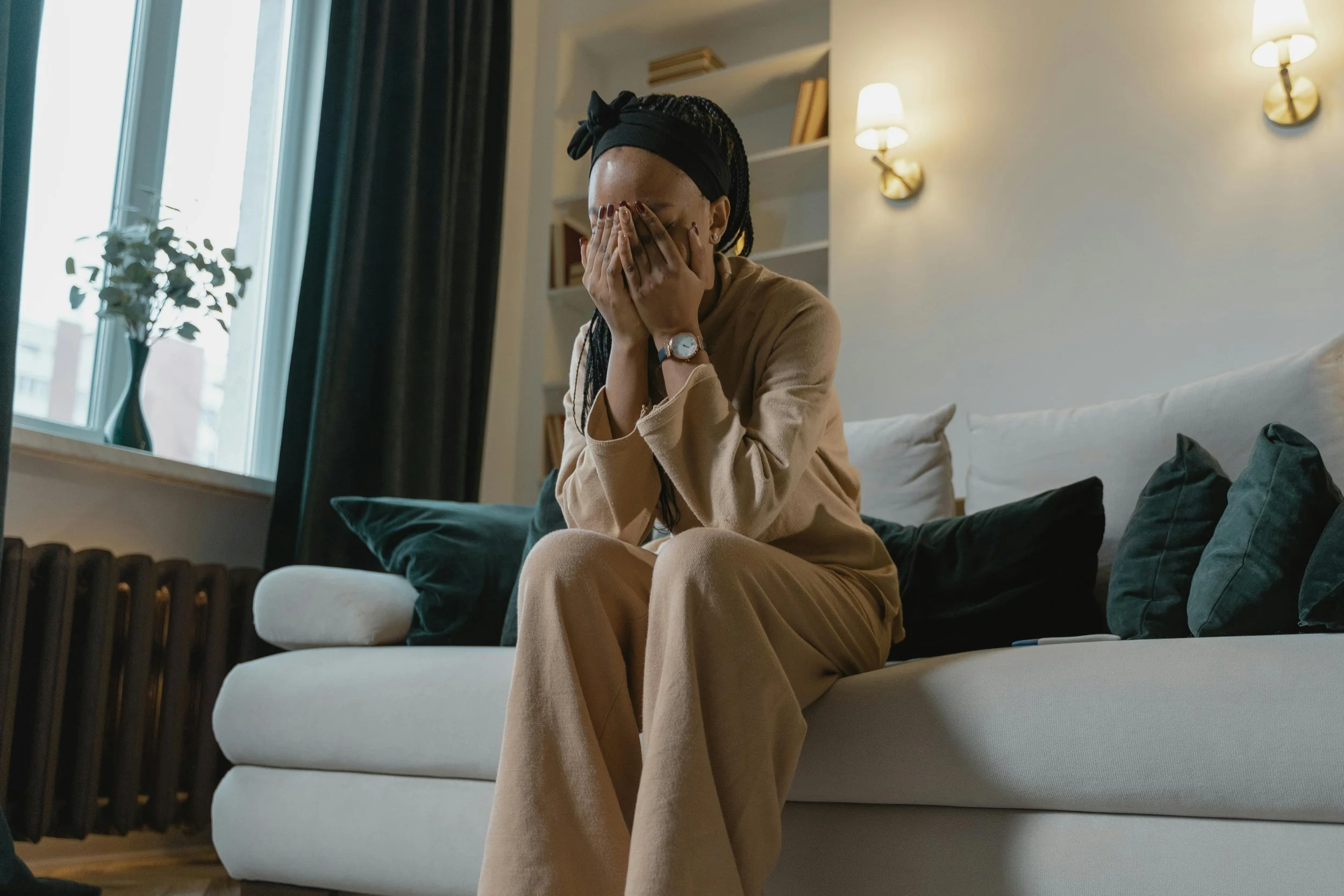Online Mental Health
Support for Individuals,
Couples, and Families
Prioritize your mental health. Our licensed therapists offer compassionate virtual care throughout Alabama, Florida, Indiana, Kentucky, Louisiana, Texas, West Virginia, and Virginia
We provide a safe space
♡
We provide a safe space ♡
When Did Life Get So Heavy?
You're exhausted, right? Exhausted from pasting on that brave smile, from pretending everything's fine when inside, you're screaming. Maybe you're drowning in a sea of constant worry that steals your joy and leaves you unable to relax. Perhaps a lingering sadness follows you like a shadow, making everything feel dull and pointless, no matter what you try.
Is your relationship stress making you feel utterly alone, misunderstood, or disconnected from the people who matter most? Or are you caught in the relentless cycle of overwhelm and burnout, juggling so many responsibilities that you feel like you're constantly on the verge of collapse?
And what about those moments of uncontrollable anger or irritability that leave you riddled with guilt and regret, straining the very connections you cherish? Are you constantly battling the nagging whisper that you're "never enough", doubting your worth, and feeling like you're stuck in a loop of self-criticism?
Maybe you're wrestling with grief and loss that feels too heavy to carry alone, or navigating major life changes like divorce, a new job, or parenthood that have completely upended your world. You want things to change, desperately, but you have no idea where to even begin. Sound painfully familiar? That's because it is your diary. This isn't just about feeling "a little off"; this is about feeling trapped in a life that doesn't feel like your own anymore.

Together, we'll explore practical ways to navigate life's challenges while focusing on your well-being and growth.
Our Process: How it Works
Schedule a free consultation
Start by booking a free 15-minute consultation to see if we’re the right fit for your needs.
Book your session
Choose a time that works for you, online or in-person, and we’ll get you scheduled.
Start therapy
Begin your journey with personalized support and tools to help you feel more empowered and at peace.
Break Free From the Cycle—We Can Help!
*
Break Free From the Cycle—We Can Help! *
You've probably tried everything, right? Talking to friends, hoping things would magically get better, maybe even just gritting your teeth and pushing through. But here you are, still feeling like you’re running on empty, misunderstood even by those closest to you, and stuck in patterns you desperately want to break. You might even be thinking your struggles "aren't bad enough" to ask for help. Let's be clear: that thought is holding you back. Therapy isn't just for a crisis; it's for anyone who's ready for life to feel lighter, clearer, and truly manageable.
We get it. Every story is unique, and that's why we offer personalized support tailored specifically to your situation. No cookie-cutter approaches here. Our clients consistently tell us they start feeling real results and real relief—often after just a few sessions—because they finally feel heard, understood, and like someone actually gets what they're going through. With our flexible, judgment-free care, you can find the support you need from the comfort of your own home, making therapy truly work for your life.
Our Therapy Services
-
It feels like everything is expensive these days. Groceries, gas… even peace of mind comes with a price tag. You kept thinking, “I know I need therapy, but I just can’t afford one more thing right now.” It’s like choosing between my mental health or my bills—and that’s not a choice anyone should have to make.
Learn More -
You might be thinking, "I just want my child to be okay. To smile more, sleep better, feel confident again. But some days, I don’t even know where to begin. I’ve tried talking, listening, being patient—but I still see the worry in their eyes, the outbursts, the anxiety, the withdrawal. And if I’m being honest, I’m scared I’m missing something."
If this sounds familiar, take a deep breath—you’re not alone, and you don’t have to figure it all out on your own.
Learn More -
Have you found yourself saying, "We don’t talk like we used to. Everything feels like a misunderstanding, or worse—silence. I miss how easy it was to laugh, to connect, to just be us. Now it feels like we’re stuck in the same cycle, having the same arguments… and I don’t know how to fix it. I don’t even know if they still care the way I do."
It doesn’t have to end here. Relationships take work, and sometimes love needs a little help finding its way back.
Learn More -
You’ve probably said, "Lately, it feels like everyone in this house is on edge. One wrong word and it turns into an argument, or worse—everyone just shuts down. I’m trying to be the glue, the peacekeeper, the one who holds it all together… but I’m tired. I don’t want us to keep walking on eggshells. I just want us to feel like a family again."
Things can get better. Family counseling isn’t about placing blame—it’s about creating space for everyone to be heard, understood, and supported.
Learn More -
You’ve always been the one who keeps it together. You don’t really talk about what’s going on, you just deal with it. Push through. Provide. Protect. But lately... it’s getting harder to carry it all. The pressure, the stress, the silence. You’re exhausted, but you don’t even know how to say that out loud. You’re not weak—you’re human.
Learn More -
You’ve been thinking about therapy for a while now. But between work, life, and everything in between, you keep putting it off. You don’t have time to drive across town. You don’t want to sit in a waiting room, wondering who you’ll run into. You simply just want help—from somewhere that feels safe, easy, and on your terms. Online counseling might be exactly what you need.
Whether you're at home, on a lunch break, or curled up on the couch in your favorite hoodie—support is just a click away.
Learn More -
You love each other—but sometimes you wonder… “are we really ready for everything that comes with marriage?” Not just the wedding, the rings, or the planning—but the real stuff. The hard conversations, the merging of two lives, the forever. You want us to start strong. You want to last.
If that sounds like your heart, you're already on the right track. Because love is a beautiful beginning—but preparation is what helps it grow.
-
It’s not that you don’t love them—you do. But somewhere along the way, the intimacy started to fade. The connection feels different… distant. You barely talk about it, and when you do, it ends in frustration or silence. You miss feeling close... But you don’t know how to bring it up without it turning into a fight—or making things worse.
If this feels familiar, you should know, it’s not the end of the story.
-
You’re tired of being everything for everyone. You smile, show up, hold it all together—but inside, you feel like you’re unraveling. Some days you don’t even know who you are outside of the roles you fill. You just want someone to ask how you’re really doing—and mean it.
You deserve a space that’s just for you—where you can speak freely, heal deeply, and grow boldly into the woman you were created to be. Because taking care of everyone else is important—but so is taking care of you. Remember, you can’t pour from an empty cup.
Areas of Expertise
Imagine This: Your Life, Unburdened.
What would it feel like to wake up without that knot in your stomach? To genuinely enjoy a quiet moment instead of being barraged by anxious thoughts? Imagine feeling truly connected in your relationships, finding peace after loss, and navigating life's challenges with a newfound sense of calm and confidence.
Imagine finally silencing that inner critic, stepping into your worth, and truly feeling "enough." Picture yourself making decisions with clarity, setting healthy boundaries, and experiencing joy and contentment that isn't fleeting. This isn't just a dream; it's what relief feels like. It's living a life where you're not just surviving, but thriving.
Your New Beginning Starts Now.
You've read this far because a part of you knows you deserve more than just getting by. You're courageous, and you're ready for a change. Don't let another day pass feeling stuck and overwhelmed.
The only way things get better is if you take the first step.
Don't wait for things to magically improve – they won't.
This is your moment. Schedule your free consultation today. Let's talk about what’s truly possible for you. You deserve to feel better, to live without that crushing weight, and to finally understand what peace feels like. You don’t have to figure this out alone, but you do have to take action.
What others are saying
Our Team
FAQs
-
YES! Therapy gives you a safe place where you’re not judged, told what to do, forced to listen to one single option, or receive retaliation for your thoughts and feelings. Therapy does take work and is not always easy. It can get uncomfortable and icky, but most of the time, you will leave feeling reenergized and validated. Therapy cannot change other people or external circumstances so the focus is you and your perception. Your therapist can provide education, feedback, guidance, options and support, but we don’t give advice or answers.
-
Start with scheduling a free consultation. Our admin team will walk you through scheduling your first session with one of our providers. Once paperwork is completed, you’ll be ready to start your therapy journey with us! Check out our New Clients Start Here page for more!
-
We have cash pay and insurance options. Check out our investment page to see if your insurance is covered.
-
Of course! We will help match you with a therapist based on your therapy needs. This can be determined by type of therapy, location, and payment options. Schedule a free consultation for more information.
Latest from the blog
Tools, insights, and support between sessions
















